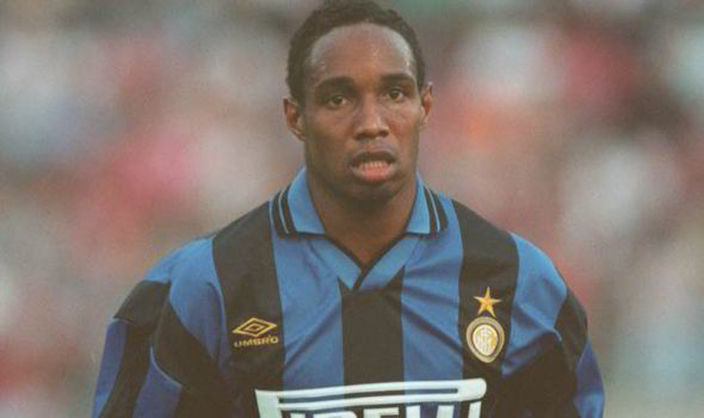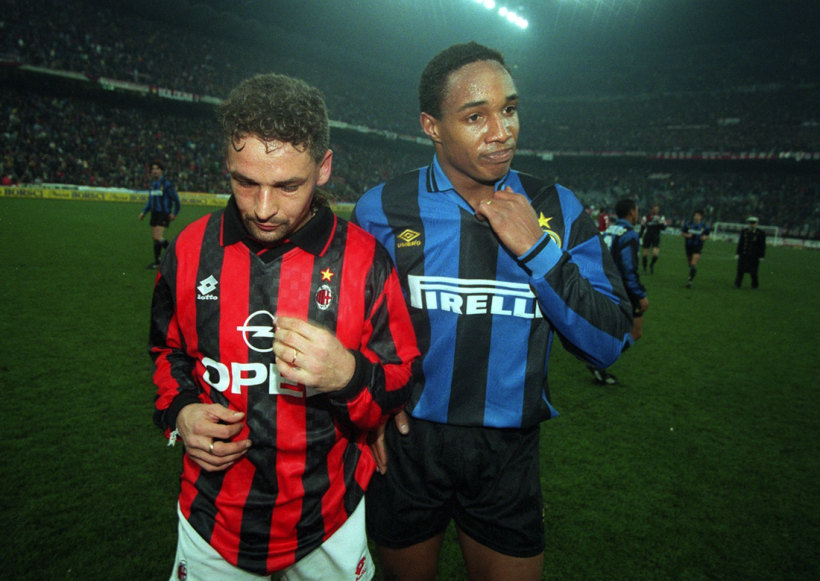When Paul Ince swapped Manchester for Milan in the summer of 1995, it was a move that left supporters of the club he departed bemused.
Ince had been a part of a young and exciting Manchester United side that emerged in the late 1980s and early 1990s. The Red Devils were beginning to dominate English football around the time of the inception of the Premier League and, in a formidable partnership with talismanic Irishman Roy Keane, Ince won ten major trophies in six years at Old Trafford. ‘The Guv’nor’, as he was nicknamed in his youth at previous club West Ham, had been a vital part of a winning team that laid the foundations for what would become two decades of unbridled success for United, both at home and in Europe.
Fans couldn’t quite believe it then when, after manager Alex Ferguson accepted a £7 million bid from Internazionale, Ince departed the north west of England to relatively little fan-fare. “It wasn’t an easy one,” Ferguson said, reflecting on his decision to sell Ince in 2008, “but I felt it was good business for the club at the time.” It’s possible, too, that with the famed ‘Class of ‘92’ beginning to stake significant claims as first team regulars for United, the Scot felt letting a player of Ince’s caliber leave would not be as significant a blow as it otherwise might have been.
The move wasn’t one Ince was keen on either, as he told Paddy Power in 2016. “When I left United it wasn’t my decision,” he remarked. “I was about to negotiate a four-year contract and sort a testimonial out, but it was down to Sir Alex Ferguson and the board and they wanted to sell me to Inter Milan. I was devastated to leave.” Nevertheless, Manchester United’s loss was Inter’s gain and Ince headed south to begin perhaps the most memorable period of his playing career.
Ince arrived at Giuseppe Meazza at a time of great turmoil for the Nerazzurri. The club had narrowly avoided relegation from Serie A in 1994, finishing one point above the relegation zone in what remains, to date, their worst ever top-flight finish. Though they had managed to win the UEFA Cup in both 1991 and 1994, they had faltered domestically. Dominance of Serie A by city rivals AC Milan and long-time adversaries Juventus had ensured Inter had not won a major domestic trophy since 1989, the year in which they won both the Scudetto and the Supercoppa Italia.
But Ince’s signing came at a time of great change for Inter. He was one of the first acquisitions made by the club under new president Massimo Moratti and would soon be joined by many more. With players such as Youri Djorkaeff, Ivan Zamorano and Aron Winter joining Ince over the next twelve months, Moratti made clear his desire to take the Nerazzurri back to the summit of Italian football. A lifelong Interista, Moratti was desperate to see his club return to dining at the top table of Italian and European football, as they had been so accustomed to throughout their history.
Ince would immediately claim a first team place on arrival, making his debut in a 1-0 victory over Vicenza at San Siro. He formed a cohesive partnership with fellow midfielder Nicola Berti and, in doing so, created a hard-working and industrious pairing that worked effectively in the often tactically complex world of calcio. Both Ince and Berti were athletic and energetic with engines that rarely tired throughout 90 minutes. That wasn’t to say they were without technical ability, however.
Ince, in particular, showed the kind of finesse and class in the final third that made him more of a goal threat than he is perhaps given credit for in hindsight. Though he only scored three goals in his debut season in Italy, he always proved a worrying prospect for opposing defences, either through his darting runs into the box or his eye for a pass, which could often split notoriously vault-like Italian defences.
By the end of his first year in Italy, Ince had helped Inter secure a seventh-place finish in Serie A. In what could be considered a moderate success for the Englishman, he’d aided the Nerazzuri in securing European football for the second successive season, through qualification for the UEFA Cup.
From an individual perspective, he was also showing signs of settling in Italy, particularly towards the end of the season. His three goals came in the last two months of the campaign, the most notable being one of eight scored by Inter in an 8-2 thrashing of lowly Padova. Furthermore, his efforts weren’t going unnoticed on the Curva Nord. “Come on Paul Ince, come on” was a chant that filled the Guiseppe Meazza within months of his arrival on the peninsula, proving that the Illford-born player had found a place in the hearts of the famously hostile Interisti.
Ince and Roberto Baggio after a Derby della Madonnina
Ince’s quick and considerable integration into life at Inter was all the more remarkable considering the social climate in Italy at the time. Ince is black and, as even the club themselves admitted, it was questionable to many whether a player of his ethnicity would be able to find a place in the affections of those in the Curva Nord. As reported by the Telegraph just before Ince’s transfer to Inter was finalised, racist graffiti on the walls of the club’s own stadium greeted him as he arrived in Milan to negotiate his contract. It wasn’t unusual for inflatable bananas to be waved in the crowds at grounds all over Italy whenever a black player touched the ball and, for Ince and other black players at the time, the culture of racism in Italy was as notorious as it was vicious. Ince had already had to overcome prejudice and break down barriers in becoming the first black captain of England’s national team and it was clear that, if he was to have any modicum of success in Italy, he would have to hurdle similar obstacles there.
Perhaps the most infamous example of the abuse he suffered was in an away game at Cremonese in April of 1996. Ince had scored the first goal in a 4-2 win for the Nerazzurri and had incurred the wrath of the hostile home crowd as a result. “They were shouting ‘N*****, n*****’, at me,” Ince recalled in a report by The Independent a month after the incident, “So I turned towards them and clapped, as if to say, ‘Yeah, well done’. That’s when the referee booked me.’”
The abuse was so severe that Ince himself admitted he considered returning to England. The arrival of compatriot Roy Hodgson as manager towards the end of his first year did much to aid the situation, however, as Ince confirmed at a press conference at Inter’s training ground later that same year. “If Hodgson hadn’t arrived five or six months ago, I probably would have gone back to England,” he stated unambiguously. “He’s like me; he wants to win. We both come from London so we’ve got that kind of aggressiveness to want to do well and win. If he should go, next year or the year after that, it would change my position completely. Hopefully that won’t happen.”
Ince also called for Moratti and others in influential positions to do more to combat the racism, noting that the considerable work done by the FA in his homeland had done much to improve the situation there. “I think an issue must be made out of it so that we get to where people and the federation are going to do something about it,” he said. But racism was regrettably something that would plague Ince and other players of an ethnic minority for the remainder of his stay in Milan.
Despite this, the success Ince achieved on the field was commendable, and his second season was arguably more successful than his first. His goal tally increased to seven in all competitions and Inter secured a third-place finish in Serie A, missing out on Champions League qualification by just four points. Even more impressively, they reached the final of the UEFA Cup and, despite losing to Schalke 04 over two legs, proved they were once again a major force on the European stage.
Ince’s influence on the team was widely acknowledged throughout Italy by the time his second season had come to a close. He was considered so integral to Inter’s success at the time that one Italian paper described the team without him as “Inter sensa Anima” or “Inter without Soul.”
President Moratti was keen for the Englishman to prolong his stay in Italy, convinced a partnership between Ince and flagship world-record signing Ronaldo would only enhance Inter’s exponential rise. Ince, who Moratti called ‘The Tiger’, owing to his ferocious work rate, would reject the club’s advances in order to return home and allow son Thomas to attend an English school, but this did little to sour Moratti’s impression of the player. Speaking to Inter Channel in 2013 following the appointment of Walter Mazzarri as manager, Moratti praised both men’s considerable work rate, saying, “It doesn’t matter how long you stay, and Ince was only here for a year and a half, there are certain individuals who stick in your mind as great Interisti because they’re great people.”
Ince’s time with Internazionale may have been short but it was definitely sweet. He retains a fondness for the club to this day and, thanks to a close relationship with Massimo Moratti that continues, his son Thomas nearly followed in his footsteps by making the switch to Italy in 2014. It’s perhaps a blessing in disguise that the move didn’t materialise. Not only would Thomas have struggled to excel at a club that has had a volatile last few years through a change in ownership, but the pressure to live up to what his father achieved may have been too much to bear.
Ince may not have returned from Italy in 1997 with more medals to add to his collection but what he did earn was perhaps even more valuable. In the face of racial prejudice and social opposition, he found a way to break down barriers and find a place in the hearts of Inter fans that he still occupies today. Moratti described him as ‘a great Interisti’ and, regardless of what parameters one might use to measure that, it’s hard to argue when the former president of the club makes such a statement. Ince will forever remain a fan favourite at Inter and, looking back, it’s easy to see why.
Words by Laura Bradburn: @LBrad88
‘Laura has had a long love affair with Calcio that began thanks to a certain Gabriel Batistuta. Whether it’s a match to decide the Scudetto or a battle at the other end of the table, she can be found on her couch most weekends taking in the wonders of Italian football.


